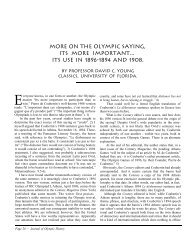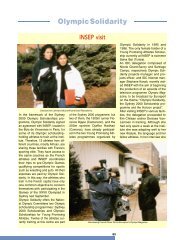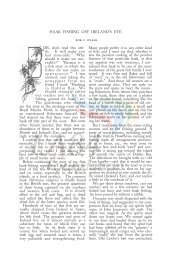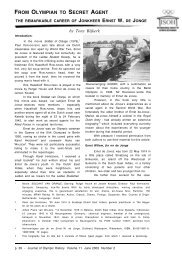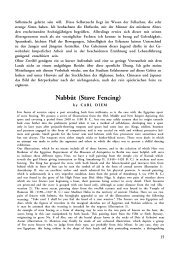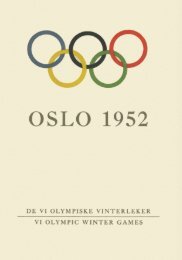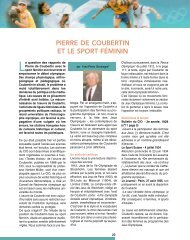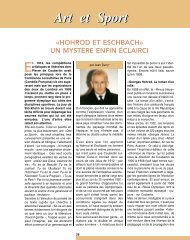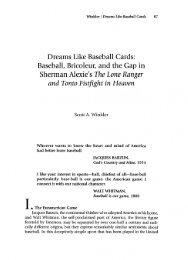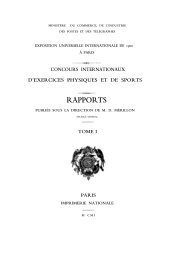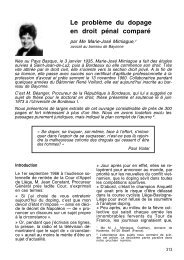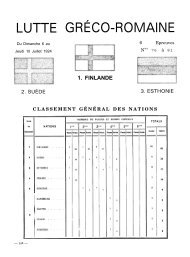The Countess de Pourtales - After All the First Modern Female ...
The Countess de Pourtales - After All the First Modern Female ...
The Countess de Pourtales - After All the First Modern Female ...
Create successful ePaper yourself
Turn your PDF publications into a flip-book with our unique Google optimized e-Paper software.
THE COUNTESS DE POURTALES -<br />
AFTER ALL THE FIRST MODERN FEMALE OLYMPIC STARTER<br />
by Karl Lennartz and Walter Teutenberg<br />
In <strong>the</strong> last number of Citius - Altius - Fortius Bill Mallon published an interesting<br />
article (“<strong>The</strong> <strong>First</strong> Women Olympians” in which he - in connection with <strong>the</strong> Olympic Games in<br />
Paris, 1900 - hinted at two female croquet players. He questioned our statement that Helen <strong>de</strong><br />
<strong>Pourtales</strong> had participated in <strong>the</strong> sailing event in May 1900. This statement had been received<br />
by Walter Teutenberg from Sven von Mitzlaff. Who is Sven von Mitzlaff?<br />
Von Mitzlaff (born 1914) was an active officer, a successful amateur ri<strong>de</strong>r from 1930<br />
to 1940 and <strong>the</strong> champion of <strong>the</strong> German amateur ri<strong>de</strong>rs from 1937 to 1940 with a total of 148<br />
victories. <strong>After</strong> <strong>the</strong> year 1945 he was successfully employed as a trainer by <strong>the</strong> studs<br />
Zoppenbroich, Waldfried and o<strong>the</strong>rs. In this function, he was responsible for several victories<br />
in <strong>the</strong> German Derby. What has Sven von Mitzlaff got to do with <strong>the</strong> <strong>Countess</strong> <strong>de</strong> <strong>Pourtales</strong>?<br />
Sven von Mitzlaff’s fa<strong>the</strong>r, Otto von Mitzlaff (1877-1938) - also a well known amateur<br />
ri<strong>de</strong>r and trainer - had been married to Auguste, <strong>Countess</strong> <strong>de</strong> <strong>Pourtales</strong> (born 1888). This<br />
Auguste was a daughter of Count Hermann <strong>de</strong> <strong>Pourtales</strong> (1847-1904) - <strong>the</strong> Olympic winner in<br />
sailing of <strong>the</strong> year 1900 - and of Margarete Manet (1857-1888), his first wife. Sven von<br />
Mitzlaff was in a sense <strong>the</strong> “step-grandson” of Helen <strong>de</strong> <strong>Pourtales</strong> who became <strong>the</strong> second<br />
wife of Count Herman von <strong>Pourtales</strong>. <strong>Countess</strong> Helen <strong>de</strong> <strong>Pourtales</strong> (1868-1945) herself was a<br />
Barby by birth, <strong>the</strong> daughter of a New York banker. Helen Barby married Hermann <strong>de</strong><br />
<strong>Pourtales</strong> in 1891. <strong>The</strong>y had three children. Helen <strong>de</strong> <strong>Pourtales</strong> thus had dual Swiss and US<br />
citizenship. Her husband, Count Hermann <strong>de</strong> <strong>Pourtales</strong> (1847-1904) was Swiss. He came<br />
from a Huguenot family who lived in Switzerland where he was born. In Berlin he was an<br />
active Prussian officer for twenty years and later returned to Switzerland. He had dual<br />
German and Swiss citizenship.<br />
Sven von Mitzlaff as a man brought up in a sporting environment is certainly a reliable<br />
witness when he expressly confirmed to Walter Teutenberg that his mo<strong>the</strong>r had participated in<br />
<strong>the</strong> sailing events on <strong>the</strong> River Seine in <strong>the</strong> year 1900 on board <strong>the</strong> “Lerina.”<br />
And this brings us to a second little correction in Bill Mallon’s article. Bill writes that<br />
Alexan<strong>de</strong>r <strong>de</strong> <strong>Pourtales</strong> won <strong>the</strong> l-2 ton class in <strong>the</strong> sailing events for Switzerland. This is not<br />
quite correct. In <strong>the</strong> sailings events of <strong>the</strong> World’s Fair, representing <strong>the</strong> Olympic Games<br />
events, on <strong>the</strong> River Seine in May 1900 it was expressly stated in <strong>the</strong> proclamation that every<br />
simple course formed an event of its own which had to be given its own prize accordingly.<br />
<strong>The</strong>re was no total classification of <strong>the</strong> three courses. Thus <strong>the</strong> crews were able to swap so<br />
that we will always remain in doubt as far as <strong>the</strong> correct establishment of results is concerned.<br />
However, in <strong>the</strong> event of <strong>the</strong> class of 10 to 20 tons, which was staged in <strong>the</strong> Channel of Le<br />
Havre in <strong>the</strong> beginning of August, <strong>the</strong> proclamation expressly spoke of three courses with a<br />
total classification. <strong>All</strong> in all <strong>the</strong>re were eleven events on <strong>the</strong> River Seine in May and only one<br />
in <strong>the</strong> Channel in August. In <strong>the</strong> first event on <strong>the</strong> River Seine (on 20 May) in <strong>the</strong> so-called<br />
Course d’honneur et d’ensemble, all <strong>the</strong> 64 boats from six countries entered were to start.<br />
However only 62 took part. In this prologue <strong>the</strong> boats had to start by classes on intervals from<br />
boats of l/2 tons to 10 tons. Because of <strong>the</strong> slack wind only seven boats were able to cross <strong>the</strong><br />
finish line by 7 PM. <strong>The</strong> “Lerina” did not belong to this number. However, as <strong>the</strong> “Lerina”<br />
had started, <strong>the</strong> <strong>Countess</strong> Helen <strong>de</strong> <strong>Pourtales</strong> had become <strong>the</strong> first woman participant in <strong>the</strong><br />
mo<strong>de</strong>rn Olympic Games according to current interpretation. In <strong>the</strong> first course of <strong>the</strong> class of<br />
l-2 tons <strong>the</strong> “Lerina” won on 22 May, <strong>the</strong> following were <strong>the</strong> results:<br />
30
Yachting - 23 June<br />
1-2 Ton Class - Race #1<br />
1. Lerina SUI 2:15:32 std<br />
(Graf Hermann von <strong>Pourtales</strong>, Grafin Helen von <strong>Pourtales</strong>, Graf Bernard von<br />
<strong>Pourtales</strong> ) . . . . . Lariviere)<br />
2. Mar<strong>the</strong> 2:17:29 std<br />
(F. Vilamitjana, Charles Hugo, Auguste Albert, . . . . . Duval)<br />
3. Nina Claire FRA 2:26:28 std<br />
(Jacques Baudrier, Lucien Baudrier, Edouard Mantois, . . . . . Dubosq)<br />
4. Amulet FRA 2:26:56 std<br />
(Eugene Laverne, Henri Laverne)<br />
5. Ducky FRA 2:31:14 std<br />
(Marcel Moisard)<br />
6. Freia FRA 2:33:54 std<br />
(. . . . . Warenhorst)<br />
German Starter:<br />
Date:<br />
Site:<br />
Teams:<br />
None<br />
22 May<br />
Seine at Meulan<br />
8 boats from 2 nations<br />
Two days later, in <strong>the</strong> second race <strong>the</strong> “Lerina” came in second after <strong>the</strong><br />
“Aschenbro<strong>de</strong>l” from Germany which won quite easily.<br />
Yachting - 25 June<br />
1-2 Ton Class - Race #2<br />
1. Aschenbro<strong>de</strong>l (1.0 ton) GER 3:09:19 std<br />
(Martin Wiesner, Ottokar Weise, Dr. Georg Naue, Heinrich Peters)<br />
2. Lerina 3:55:14 std<br />
(Graf Hermann von <strong>Pourtales</strong>, Grafin Helen von <strong>Pourtales</strong>, Graf Bernard von<br />
<strong>Pourtales</strong> ) . . . . . Lariviere)<br />
3. Mar<strong>the</strong> 3:57:49 std<br />
(F. Vilamitjana, Charles Hugo, Auguste Albert, . . . . . Duval<br />
4. Nina Claire FRA 4: 10:17 std<br />
(Jacques Baudrier, Lucien Baudrier, Edourard Mantois, . . . . . Dubosq)<br />
5. Freia FRA 4:11:22 std<br />
(. . . . .Warenhorst)<br />
6. Mamie FRA 4:30:08 std<br />
(Texier fils)<br />
German Starters: Aschenbro<strong>de</strong>l [Martin Wiesner, Ottokar Weise, Dr. Georg Naue,<br />
Heinrich Peters]<br />
Date: 24 May<br />
Site: Seine at Meulan<br />
Teams: 10 boats from 3 nations<br />
We assume that Sven von Mitzlaff had been correctly informed by his stepgrandmo<strong>the</strong>r,<br />
<strong>the</strong> <strong>Countess</strong> <strong>de</strong> <strong>Pourtales</strong> and thus she was <strong>the</strong> first woman to participate in <strong>the</strong><br />
31
mo<strong>de</strong>rn Olympic Games. She had started in three events and had belonged to <strong>the</strong> winning<br />
crews in two events. And <strong>the</strong>refore - according to our interpretation - she is a double gold<br />
medal winner.<br />
In addition we would like to contribute an item to <strong>the</strong> women croquet-players. In <strong>the</strong><br />
journal La Vie au Grand Air it was stated in connection with a croquet game on <strong>the</strong> occasion<br />
of <strong>the</strong> events of <strong>the</strong> World’s Fair: “Among those who had entered <strong>the</strong>re was a ma<strong>de</strong>moiselle<br />
yesterday. Fur<strong>the</strong>rmore Mme. Depres, <strong>the</strong> wife of <strong>the</strong> presi<strong>de</strong>nt of <strong>the</strong> French Croquet<br />
Association, was missed who, though being present on this day and playing a few rounds, did<br />
not participate in <strong>the</strong> event of <strong>the</strong> World’s Fair.<br />
It is generally accepted in Olympic history that women had successfully participated in<br />
<strong>the</strong> tennis and golf Tournaments in Paris. However, and according to our interpretation <strong>the</strong>re<br />
is no o<strong>the</strong>r way, if we <strong>de</strong>al on equal terms with all <strong>the</strong> amateur sports events at <strong>the</strong> World’s<br />
Fair and at <strong>the</strong> Olympic Games - in <strong>the</strong> year 1900, <strong>the</strong>n <strong>the</strong>re was a fur<strong>the</strong>r women participant<br />
in <strong>the</strong> Olympic Games: this in <strong>the</strong> free ballooning event, contested between 17 June and 12<br />
October. Twenty-one disciplines in this event were performed. From 9-12 October <strong>the</strong><br />
distance and endurance discipline for top ballooners were staged. Here Maison from France<br />
(who finished fourth) remained in <strong>the</strong> air for 11:38 hours, covered 650 km and starting in<br />
Paris, reached Keulroth in Silesia. As a helper his wife Mme. Maison had been on board with<br />
him, and thus would be ano<strong>the</strong>r female Olympian in 1900. By <strong>the</strong> way <strong>the</strong> winner, Count<br />
Henry <strong>de</strong> la Vaulx, toge<strong>the</strong>r with Count Castillon <strong>de</strong> Saint-Victor, was in <strong>the</strong> air for 35:45<br />
hours, nearly reaching Kiev in Russia after covering 1,925 km.<br />
This information was collected from our latest book II. Olympische Spiele in Paris<br />
1900 which was recently published in <strong>the</strong> Agon-Verlag in D-34121 Kassel/Germany<br />
(Frankfur<strong>the</strong>r Str. 92 A). [Editor’s Note: See review of this book in <strong>the</strong> Book Review section<br />
on p. 38 of this issue.]<br />
32
PRESIDENT’S MESSAGE<br />
Tuesday, 5 December 1995, marked <strong>the</strong> fourth anniversary of <strong>the</strong> founding of ISOH<br />
and our first “Olympiad” has now come to a close. Sadly, just a few weeks earlier we learned<br />
of <strong>the</strong> <strong>de</strong>ath of Erich Kamper, our Honorary Presi<strong>de</strong>nt, and <strong>the</strong> doyen of Olympic historians.<br />
Although I never had <strong>the</strong> pleasure of meeting Erich, my first letter from him was dated 20<br />
April 1974 and after 21 years of regular correspondance it seems as if I have lost a close<br />
friend. I am sure you will all share <strong>the</strong> sentiments expressed by Bill Mallon in <strong>the</strong><br />
accompanying obituary.<br />
When ISOH was foun<strong>de</strong>d by a small group of historians in London in 1991, I was<br />
<strong>de</strong>lighted to be asked to serve as <strong>the</strong> first Presi<strong>de</strong>nt although I can now confess that I<br />
entertained some reservations about <strong>the</strong> need for such an organization. I felt that I knew of<br />
just about everyone interested in Olympic History and that <strong>the</strong> need to formalize many years of<br />
amicable correspondance was perhaps not necessary. How wrong I was! Since <strong>the</strong> founding<br />
of ISOH, I have ma<strong>de</strong> countless new and knowledgable friends, many of whom I have had <strong>the</strong><br />
pleasure of meeting personally and I am sure that through ISOH o<strong>the</strong>r members have also been<br />
able to wi<strong>de</strong>n <strong>the</strong>ir field of contacts.<br />
<strong>The</strong> main vehicle for learning of members with similar interest is, of course, our<br />
journal, Citius, Altius, Fortius, and we owe an immense <strong>de</strong>bt to Bill Mallon for editing a<br />
publication of such high quality. From <strong>the</strong> very first issue he produced a journal which was<br />
far superior to many of <strong>the</strong> publications of societies of much longer standing. However, all of<br />
Bill’s efforts would have been in vain without <strong>the</strong> necessary finances to meet <strong>the</strong> printing and<br />
postage costs. Here we are in<strong>de</strong>bted to IOC Presi<strong>de</strong>nt Juan Antonio Samaranch, for making<br />
funds available to meet <strong>the</strong> cost of publication.<br />
Speaking of <strong>the</strong> IOC, many of you will already know that Karel Wendl, former<br />
Director of <strong>the</strong> Olympic Studies and Research Centre for <strong>the</strong> IOC, has now retired and I am<br />
<strong>de</strong>lighted to report that, in recognition of all <strong>the</strong> help he gave to ISOH during our early years,<br />
Karel has been elected an Honorary Life Member by <strong>the</strong> Executive Committee. We wish him<br />
a long and happy retirement.<br />
I believe it can be safely said that our first “Olympiad” has been successful. We are<br />
now recognized by a number of international aca<strong>de</strong>mic bodies, and many of our members have<br />
published <strong>the</strong> results of <strong>the</strong>ir researches in a particular field. <strong>The</strong> wi<strong>de</strong>-ranging nature of <strong>the</strong><br />
articles in <strong>the</strong> Journal also serves to confirm <strong>the</strong> growing interest in Olympic history. Starting<br />
in 1996, ISOH will be listed as a recognized organization in <strong>the</strong> Olympic Movement Directory,<br />
published by <strong>the</strong> IOC.<br />
In closing, I would like to express my thanks to <strong>the</strong> members of <strong>the</strong> Executive<br />
Committee for <strong>the</strong>ir support during my term of office and I look forward to meeting <strong>the</strong>m and<br />
many o<strong>the</strong>r members in Atlanta.<br />
Ian Buchanan<br />
Presi<strong>de</strong>nt, IS OH<br />
2



